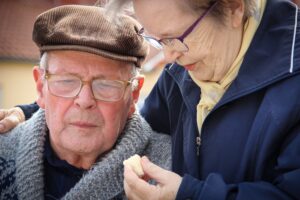By Rhonda R. Fletcher, Contributing Writer

REGION – One in five Americans, over 53 million, are caring for a family member in the United States.
In the Commonwealth, an estimated 840,000 individuals serve as family caregivers, dedicating 700 million hours per year at an estimated value of $12 billion in unpaid healthcare services.
Impact on family caregivers
According to AARP, 23% of family caregivers are in worse health compared to five years ago. Family caregivers end up juggling personal lives and the responsibilities of caring for a loved one―often ignoring the simple things that ensure mental and physical health. Other things that go unresolved include grief and loss management and financial management.
Depending on the intensity, caregiving can result in chronic stress, depression, sleep disorders, financial distress, poor health-related quality of life (HRQOL), and early mortality. And if attention requires a continuous 24/7 responsibility, the danger to the caregiver’s health increases.
One 1999 study published in the Journal of the American Medical Association made a startling correlation between caregiver strain and future mortality rates. The study suggested that the combination of grief, prolonged distress, and the physical demands of caregiving compromise caregiver health―leading to increased mortality. In fact, within four years of cessation of intense caregiving, there was a 63% higher mortality risk.
Getting support through clinical studies
Sometimes caregivers need outside support to recognize caregiver strain and reverse the cycle.
One way to find help while helping others is to enroll in a caregiver clinical trial. A study can enhance personal well-being, provide solutions, and strengthen an individual’s effectiveness as a caregiver.
There are numerous private and public universities and organizations conducting surveys, studies, and formalized clinical trials that focus on generalized family caregiving concerns, families dealing with chronic disabling health conditions, and health and service providers.
Researchers often need study volunteers to determine the usefulness of experimental treatments or whether new technologies help gather data and ultimately improve the lives of family caregivers.
Over the past decade, family caregiving has crossed from a familial obligation to a vital but unrecognized arm of healthcare. And the rise in family caregiver academic studies and clinical trials seeking data is notable.
The Family Caregiver Alliance lists current clinical trials actively seeking family caregivers.
In a recent study listed on ClinicalTrials.gov, intervention for ethnic and underserved family caregivers used wearable technology for real-time monitoring of caregivers’ stress and sleep. In addition to data collection, the study delivered intervention and stress reduction techniques, support/listening, and caregiving education to improve the caregiver’s health and wellbeing.
The UCLA Care2Sleep Education Program recruited caregivers to test two different education programs that teach simple strategies to help those with memory problems and their caregivers sleep better. And University of Washington researchers recruited family caregivers to help evaluate a text messaging intervention to improve caregiver wellbeing.
One study conducted by researchers at Emory University tests an online self-administered caregiver program. Funded by the National Institute on Aging (NIA), the Tele-Savvy@Home study’s purpose is to provide caregivers with the needed skills, knowledge, confidence to provide care. Participants receive a series of daily caregiving video lessons, self-guided learning strategies, and exercises to enhance skills.
Some of the benefits
Engaging in yet another activity seems dubious when time is at a premium. Many research studies, however, offer a small stipend or a certification in a new skill.
Ultimately, participation in a family caregiver survey or study may offer continuing support and provide valuable data supporting caregiver needs and encouraging new questions.
The updated demographic and statistical study recently released by the National Caregiver Alliance (NCA) and the American Association of Retired Persons (AARP) defines and reinforces the upspoken fact that the caregiver nation’s size, scope, and responsibility are increasing at an alarming rate.
RELATED CONTENT:
Alexa Together is next generation of remote assistance for older adults (fiftyplusadvocate.com)
Tax credits possible for family caregivers (fiftyplusadvocate.com)
Do your homework before choosing a caregiver agency (fiftyplusadvocate.com)












